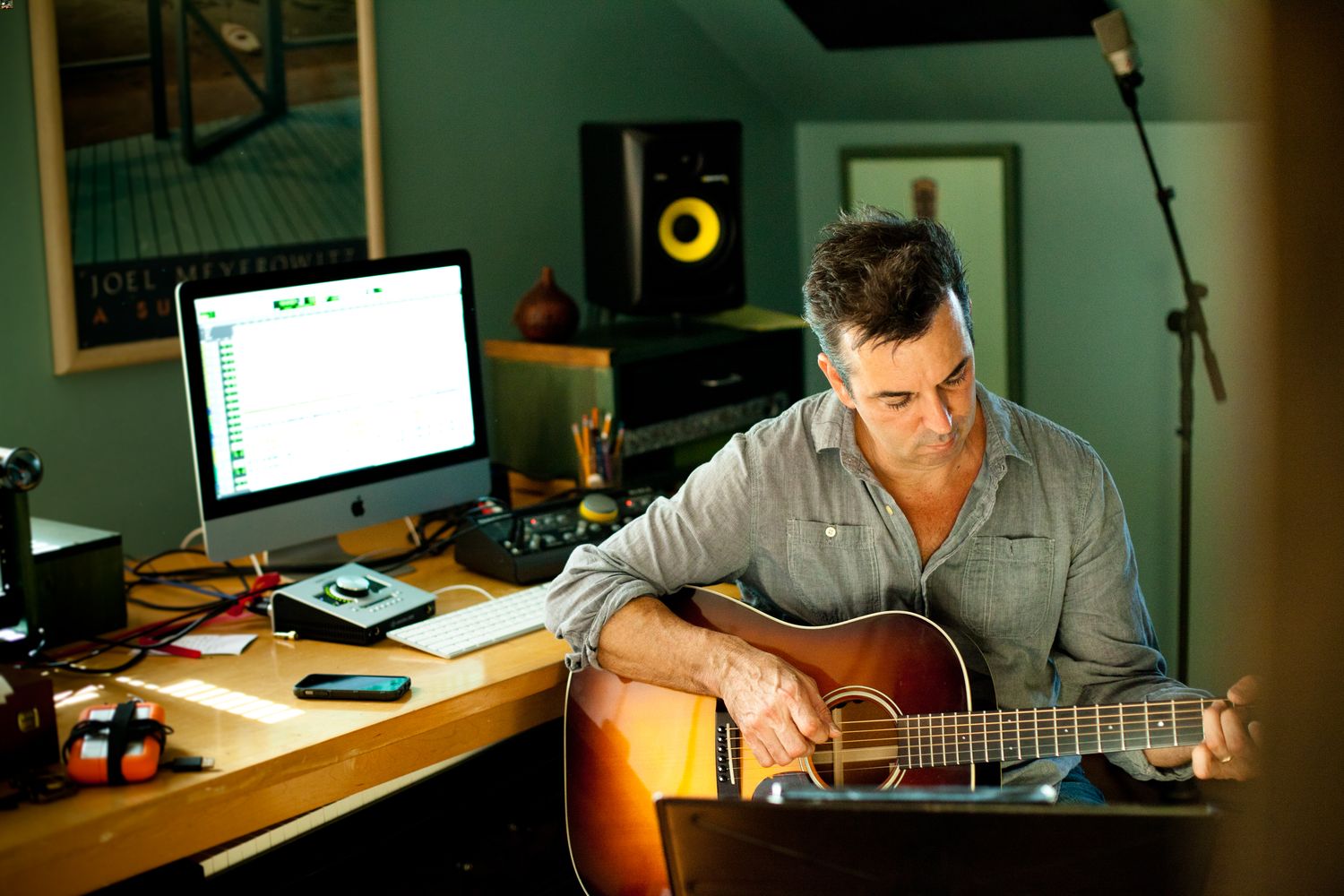Home>Production & Technology>Singer>How To Know If You’re A Good Singer


Singer
How To Know If You’re A Good Singer
Published: February 28, 2024
Discover the signs that indicate you're a talented singer and learn how to improve your vocal skills. Find out if you have what it takes to be a successful singer.
(Many of the links in this article redirect to a specific reviewed product. Your purchase of these products through affiliate links helps to generate commission for AudioLover.com, at no extra cost. Learn more)
Table of Contents
Introduction
Are you passionate about singing? Do you often find yourself lost in the melodies of your favorite songs, or perhaps you have a burning desire to share your voice with the world? If so, you may have pondered the question, "Am I a good singer?" Whether you are a novice or have been honing your craft for years, assessing your vocal abilities is an essential step in your musical journey.
As you embark on this quest for self-discovery, it's important to remember that singing is a deeply personal and subjective art form. What one person perceives as a beautiful voice, another may interpret differently. However, there are certain fundamental aspects of singing that can help you gauge your proficiency and identify areas for improvement.
In this comprehensive guide, we will delve into the key elements that contribute to a singer's skill and artistry. From understanding pitch and tone to mastering breathing techniques and vocal control, we will explore the multifaceted nature of singing and provide valuable insights to help you evaluate your own abilities.
So, if you've ever wondered whether you possess the qualities of a good singer, or if you're simply seeking to refine your vocal talents, join us on this enlightening journey. Together, we will unravel the nuances of vocal performance and empower you to embrace your unique voice with confidence and authenticity. Let's embark on this harmonious exploration of self-discovery and musical growth.
Understanding Pitch and Tone
The foundation of vocal prowess lies in the mastery of pitch and tone. Pitch refers to the perceived frequency of a sound, while tone encompasses the quality and timbre of the sound produced. As a singer, honing your ability to discern and manipulate pitch and tone is pivotal to delivering a captivating performance.
Pitch accuracy is a hallmark of a skilled vocalist. It involves hitting the right notes consistently, staying in tune with the melody, and transitioning smoothly between pitches. A good singer possesses a keen ear for pitch, allowing them to effortlessly navigate through various musical scales and intervals. Whether singing a soulful ballad or an upbeat pop song, maintaining pitch precision is essential for captivating the audience and conveying the intended emotions of the song.
Furthermore, understanding tone is crucial for infusing depth and emotion into your vocal delivery. Tone encompasses the unique color and texture of your voice, which can range from warm and velvety to bright and resonant. Developing control over your vocal tone empowers you to convey a myriad of emotions, from raw vulnerability to exuberant joy, adding layers of nuance to your performances.
To evaluate your proficiency in pitch and tone, consider recording yourself singing different genres and styles of music. Listen attentively to your recordings, paying close attention to your intonation, pitch transitions, and the overall timbre of your voice. Additionally, seek feedback from experienced vocal coaches or trusted peers, as their insights can offer valuable perspectives on your pitch accuracy and tonal expression.
In the pursuit of refining your pitch and tone, vocal exercises and training play a pivotal role. Practicing scales, vocal warm-ups, and ear training exercises can significantly enhance your pitch perception and control. Moreover, experimenting with various vocal techniques and resonating chambers within your body can aid in shaping the tonal quality of your voice, allowing you to explore a diverse range of expressive possibilities.
Ultimately, the journey to mastering pitch and tone is a continuous process of self-discovery and refinement. Embrace each opportunity to sing with intention and authenticity, allowing your innate musicality to shine through. By nurturing your sensitivity to pitch and tone, you can elevate your vocal artistry and captivate audiences with the sheer beauty and emotional depth of your singing.
Breathing and Support
Effective breathing and proper vocal support form the cornerstone of a strong and resonant singing voice. The way you breathe directly impacts the quality, power, and control of your vocal delivery.
When it comes to singing, the breath is not merely a physiological function; it becomes a vital tool for shaping and sustaining musical phrases. Proper breathing techniques enable singers to maintain consistent airflow, resulting in sustained and powerful vocal projection.
One of the key aspects of efficient breathing for singing is diaphragmatic breathing. This technique involves engaging the diaphragm to draw in a deep breath, allowing the lungs to fully expand and the breath to be released in a controlled manner. By mastering diaphragmatic breathing, singers can access a more significant reservoir of air, leading to improved vocal endurance and a richer, more resonant tone.
In addition to diaphragmatic breathing, understanding the concept of breath support is essential for singers. Breath support involves the coordinated engagement of the abdominal muscles, lower back, and intercostal muscles to regulate the exhalation of air while singing. This support system acts as a stabilizing force, allowing singers to maintain consistent airflow and control the release of breath throughout their vocal phrases.
To assess your proficiency in breathing and support, consider how effortlessly you can sustain long phrases without running out of breath or experiencing vocal strain. Pay attention to the sensation of breath flowing smoothly and steadily, supporting your vocal delivery with unwavering consistency.
Engaging in targeted breathing exercises, such as sustained breath control drills and breath extension techniques, can significantly enhance your respiratory capacity and support mechanism. These exercises not only strengthen the diaphragm and surrounding muscles but also cultivate a heightened awareness of breath management during singing.
Furthermore, incorporating mindfulness and body awareness into your breathing practice can yield profound benefits. By tuning into the physical sensations of breathing and the subtle movements of the diaphragm, you can develop a profound connection between breath, body, and voice, leading to a more organic and effortless vocal production.
In essence, mastering the art of breathing and support empowers singers to unlock the full potential of their voices. By cultivating a robust breath management system and harnessing the power of controlled exhalation, you can imbue your singing with unwavering strength, clarity, and expressive dynamism. Embrace the journey of refining your breathing techniques, and witness the transformative impact it has on your vocal artistry.
Vocal Range and Control
Mastering vocal range and control is a pivotal aspect of a singer's artistry, shaping the capacity to traverse diverse musical landscapes with precision and emotive depth. Vocal range refers to the span of notes a singer can comfortably produce, encompassing the lowest to the highest pitches within their repertoire. Understanding and expanding your vocal range can unlock a myriad of expressive possibilities, allowing you to tackle a wide array of musical genres and vocal styles.
Assessing your vocal range involves identifying the lowest and highest notes you can sing with clarity and ease. It is essential to explore the full extent of your range, paying attention to any areas that may require additional flexibility or refinement. By doing so, you can gain a comprehensive understanding of your vocal capabilities and tailor your repertoire to showcase your strengths while nurturing areas that warrant development.
Furthermore, vocal control plays a pivotal role in harnessing the full potential of your range. It encompasses the ability to modulate volume, sustain notes with unwavering stability, and execute intricate melodic embellishments with finesse. A good singer exhibits mastery over their vocal control, effortlessly navigating through dynamic shifts and subtle nuances within a song.
To evaluate your vocal range and control, engage in vocal exercises that span the breadth of your capabilities. From exploring your lower register with resonant vocal exercises to ascending to your upper register with precision and clarity, these exercises offer insights into the nuances of your vocal range and the level of control you wield over each segment.
Expanding your vocal range and refining vocal control is a gradual process that demands patience, persistence, and diligent practice. Engage in regular vocal warm-ups and exercises designed to stretch and strengthen your vocal muscles, gradually extending the boundaries of your range while honing the subtleties of vocal control.
Moreover, seeking guidance from experienced vocal coaches can provide invaluable insights into optimizing your vocal range and enhancing control. They can offer tailored exercises, techniques, and personalized feedback to help you overcome any limitations and refine the full spectrum of your vocal abilities.
Ultimately, the quest to master vocal range and control is an ongoing journey of self-discovery and artistic growth. Embrace the nuances of your unique vocal instrument, and revel in the process of expanding your range and refining your control. With dedication and a spirit of exploration, you can harness the full expressive potential of your voice and captivate audiences with your boundless vocal artistry.
Articulation and Diction
Articulation and diction are pivotal facets of vocal performance, wielding the power to convey lyrical clarity and emotional resonance. Articulation encompasses the precision and clarity with which vocal sounds and consonants are enunciated, shaping the intelligibility of the lyrics being sung. Diction, on the other hand, pertains to the overall manner in which words and syllables are articulated, influencing the comprehensibility and emotive impact of the vocal delivery.
A good singer demonstrates a nuanced command of articulation and diction, ensuring that every word is articulated with precision and imbued with the appropriate emotional weight. To assess your proficiency in articulation and diction, consider how distinctly and crisply you enunciate consonants and syllables within the lyrics of a song. Pay attention to the clarity of your diction and the degree to which your vocal articulation enhances the overall narrative and emotional depth of the song.
Furthermore, the mastery of articulation and diction extends beyond mere vocal enunciation; it encompasses the art of storytelling through song. Each word becomes a vessel for conveying a spectrum of emotions, from profound vulnerability to unbridled passion. A skilled singer leverages their command of articulation and diction to infuse each lyric with authenticity and resonance, forging a profound connection with their audience.
Engaging in vocal exercises geared towards refining articulation and diction can yield transformative results. Practicing tongue twisters, enunciation drills, and lyrical phrasing exercises can sharpen your articulatory precision and enhance the clarity of your diction. Moreover, delving into the emotional context of the lyrics and exploring the subtle nuances of each word empowers you to infuse your vocal delivery with heightened expressiveness and narrative depth.
Seeking feedback from vocal coaches and peers can provide valuable insights into refining your articulation and diction. Their perspectives can shed light on areas that may benefit from further attention, guiding you towards honing a more polished and evocative vocal delivery. Embrace each opportunity to delve into the intricacies of articulation and diction, allowing your vocal storytelling to resonate with authenticity and emotional poignancy.
In essence, mastering articulation and diction elevates the storytelling potential of your singing, allowing you to weave a captivating tapestry of emotions and narratives through your vocal performance. Embrace the art of vocal enunciation, infusing each word with intention and resonance, and witness the profound impact it has on the evocative power of your singing.
Stage Presence and Confidence
Stage presence and confidence are indispensable facets of a compelling vocal performance, transcending mere vocal proficiency to encompass the art of captivating an audience and commanding the stage with unwavering charisma and poise. A singer's stage presence encompasses their ability to engage and enthrall an audience through captivating body language, expressive gestures, and an undeniable aura of confidence that permeates their every movement and vocal delivery.
Confidence forms the bedrock of stage presence, infusing a singer's performance with an infectious energy and magnetic allure. A confident performer exudes self-assuredness, radiating a palpable sense of conviction in their vocal delivery and stage demeanor. This confidence empowers singers to connect with their audience on a profound level, transcending the physical boundaries of the stage to forge an intimate and immersive musical experience.
To cultivate stage presence and confidence, singers must embrace a holistic approach that encompasses both physical and psychological elements. Engaging in mindfulness practices and visualization techniques can foster a resilient mindset, allowing performers to channel nerves and apprehensions into a source of empowering energy. Moreover, adopting a poised and open body posture can convey a sense of confidence and approachability, inviting the audience to become active participants in the musical journey.
Furthermore, the art of stage presence extends beyond individual confidence to encompass the dynamics of interaction and engagement with the audience. A captivating performer leverages eye contact, expressive gestures, and dynamic movement to establish a profound rapport with their audience, inviting them to embark on an emotive and immersive musical voyage. By embracing the stage as a platform for genuine connection and shared experiences, singers can transcend the confines of performance to create transformative and unforgettable moments.
Incorporating stage presence and confidence into vocal performances is a continuous process of self-discovery and refinement. Embrace each opportunity to step onto the stage with unwavering conviction and an open heart, allowing your innate charisma and authenticity to shine through. With each performance, nurture a sense of fearlessness and unyielding confidence, empowering yourself to share your unique musical narrative with the world.
In essence, stage presence and confidence are the cornerstone of a captivating and memorable vocal performance. By infusing your singing with unwavering confidence and magnetic stage presence, you can transcend the realms of mere vocal proficiency, leaving an indelible imprint on your audience and forging a profound connection that transcends the boundaries of the stage. Embrace the transformative power of stage presence and confidence, and embark on a musical journey that resonates with authenticity, charisma, and unwavering conviction.
Receiving Feedback and Improvement
Receiving feedback is a pivotal aspect of a singer's journey towards continual growth and refinement. Constructive feedback serves as a mirror that reflects the nuances of one's vocal performance, offering invaluable insights into areas of strength and opportunities for improvement. Embracing feedback with an open mind and a willingness to evolve is instrumental in nurturing artistic growth and honing the artistry of singing.
When seeking feedback, it is essential to cultivate a receptive mindset, viewing feedback not as criticism, but as a catalyst for advancement. Whether from vocal coaches, peers, or audiences, each perspective offers a unique vantage point that contributes to a comprehensive understanding of one's vocal prowess. By actively soliciting feedback, singers gain access to a diverse spectrum of insights, enabling them to identify patterns, discern recurring areas of commendation or critique, and chart a trajectory for targeted improvement.
Moreover, the process of receiving feedback extends beyond mere reception; it encompasses the art of discernment and selective assimilation. Not all feedback holds equal weight, and discerning the relevance and applicability of each critique is crucial. By evaluating feedback through a discerning lens, singers can distill actionable insights that resonate with their artistic vision and align with their aspirations for growth. This discernment empowers singers to leverage feedback as a catalyst for targeted improvement, channeling constructive critiques into actionable steps for refinement.
Incorporating feedback into one's vocal practice involves a spirit of adaptability and a commitment to continual improvement. Whether addressing technical aspects such as pitch accuracy and vocal control or delving into the emotional nuances of performance, each piece of feedback serves as a stepping stone towards elevating one's vocal artistry. Embrace the process of iterative refinement, leveraging feedback as a catalyst for growth and evolution, and witness the transformative impact it has on your vocal prowess.
Furthermore, the journey of improvement is not solitary; it thrives within the context of a supportive and nurturing community. Engage in collaborative rehearsals, vocal workshops, and peer-to-peer feedback sessions, fostering an environment of mutual encouragement and growth. By cultivating a network of peers and mentors who champion your artistic evolution, you not only gain access to diverse perspectives but also foster a sense of camaraderie and shared growth within the musical community.
In essence, the art of receiving feedback and embracing improvement is a testament to the resilience and adaptability of a singer's artistic journey. By fostering a receptive mindset, discerning the essence of feedback, and integrating it into a holistic framework of growth, singers can embark on a transformative path towards continual refinement and artistic evolution. Embrace the wisdom inherent in feedback, and let it serve as a guiding beacon illuminating the path towards unparalleled vocal artistry and expressive depth.











